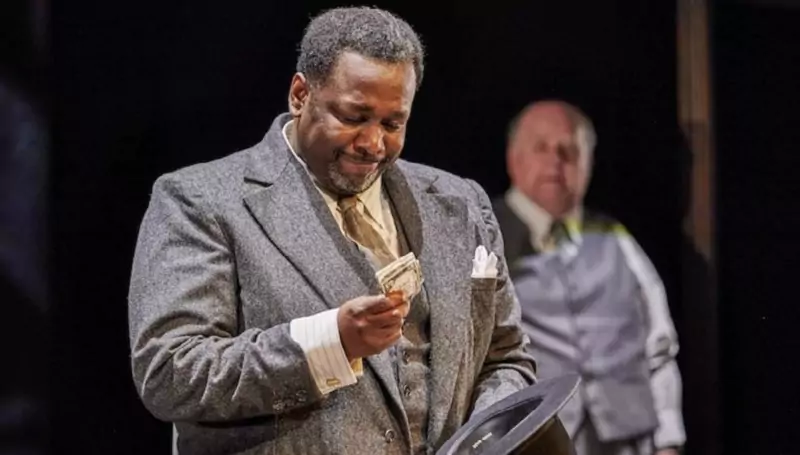“Death of a Salesman” at the Young Vic
Neil Dowden on the South Bank
1 June 2019
Arthur Miller’s 1949 classic Death of a Salesman is one of the most performed plays of the modern era. The great thing about this latest revival, Marianne Elliott and Miranda Cromwell’s production at the Young Vic, is that – without altering the text or uprooting it from its post-war Brooklyn setting – it sheds fresh light on this familiar drama in a persuasive interpretation that makes perfect sense of its themes. The tragic demise of failing salesman Willy Loman is re-minted to deliver a devastating emotional pay-off.
Here the Loman family is African-American, struggling against the odds in an exploitative capitalist system of a consumer society that in its nature thrives on equality. Without laying it on too thick, there are subtle hints of racial discrimination in the staging, such as Willy’s white employer Howard Wagner recoiling when touched by him. It is also suggested that, despite Willy’s repeated emphasis on the importance of being “well-liked” in his job, when he confides to his wife Linda that “people don’t seem to take to me” it is because of his colour. Willy is still very much an American everyman, but social divisions are highlighted here.
The show fully conveys the splintering subjective realities of Willy’s mind as he breaks down in a play that Miller was originally going to call “The Inside of His Head”. The action moves fluidly between the present, as the 63-year-old Willy agonizingly confronts the end of his career and indeed his life), and an escape into rose-tinted recollections of a happier past with his family (interrupted by a flickering nightmarish memory that cannot ultimately be suppressed); there are also hallucinatory dialogues with his much older and richer brother Ben. The show makes us question how much is Willy’s interior fantasy and how much is objective fact, as it pushes to the limits and beyond of realistic drama.
Anna Fleischle’s ingeniously slippery design features a multi-level house that does not seem a home of substance, with door and window frames and furniture suspended in mid-air. This disorientating effect is reinforced by expressionistic lighting effects (from Aideen Malone) for flashbacks, accompanied by a clicking sound like rotating projector slides (from Carolyn Downing), with Willy’s sons as boys moving in stylized fashion. Fermi Temowo’s music encompassing blues, jazz, soul and gospel provides a distinctive ambience, including a prologue and epilogue in which the ensemble come together in heartfelt song. Elliott and Cromwell maintain an astonishing emotional intensity over three hours by marshalling the cast superbly.
In what is fundamentally a domestic tragedy with wider political reverberations, the intimate relations between the Lomans are poignantly believable. As Willy, the American actor Wendell Pierce gives a thoroughly convincing account of an average Joe with delusions of success which ruin not only himself but his family. His heavy shuffling gait suggests a man at the end of his tether, with temper tantrums interspersed with spasms of misplaced optimism. As Linda, Shanon D. Clarke gives a highly moving performance as the emotional bedrock trying to keep the family together, fiercely loyal to a husband who does not appreciate her true worth. Arinzé Kene also impresses as the older son Biff, a drop-out who has never recovered from finding out that his previously idolized father is an adulterous fraud. And Martins Imhangbe gives the philandering younger son Happy a boyishly superficial charm.
There’s strong support from Trevor Cooper as Willy’s kind but exasperated neighbour Charley, a true friend unable to stop Willy’s path to self-destruction, and Ian Bonar as Charley’s son Bernard, a school geek turned high-flying lawyer who is saddened by his old school friend Biff’s failure to realize his potential. Matthew Seadon-Young is the hard-nosed, condescending Howard who throws Willy on the scrap heap after 34 years of service. And Joseph Mydell plays the ghostly, white-linen-suited Uncle Ben, who apparently becomes a diamond tycoon after walking into the jungle in Africa – a mythical vision that may be as illusory as the American Dream Itself.

